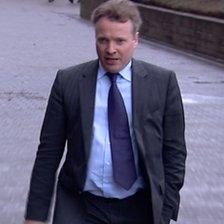Rangers owner Craig Whyte may have lied in court case
- Published
The BBC obtained a transcript of the judgement which imposed the ban
BBC Scotland has uncovered evidence which suggests Rangers owner Craig Whyte may have lied in court.
During a civil case last year, he told Glasgow Sheriff Court his seven-year ban from being a company director did not relate to treatment of creditors.
But the judge who imposed the ban said company assets were "put out of the reach of the creditors".
The Rangers owner accused the BBC of a "witch-hunt" and said the matter would be dealt with robustly by his lawyers.
Mr Whyte's seven-year disqualification, imposed in 2000, was revealed by a BBC Scotland investigation - Rangers: The Inside Story - which was broadcast in October.
After it was aired, Mr Whyte stated publicly that his ban related to a "technicality".
The programme also heard allegations that Mr Whyte controlled a company called Re-Tex Plastic Technology despite his ban, an offence which could incur a two-year jail term.
Following the documentary, Mr Whyte denied all the claims "in the strongest possible terms" and said he would be launching legal action against the BBC. The corporation has, as yet, not received a writ.
BBC Scotland has now obtained documents, dated after Mr Whyte was disqualified in 2000, appear to show that he controlled 85% of Re-Tex shares.
However, Mr Whyte continues to deny being anything other than a small investor in the company, which was wound up in 2003.
In a separate matter, the Rangers owner appeared in court in December to contest a case over an alleged unpaid £90,000 repair bill at his castle.
The 40-year-old, who was listed as owner of Tixway UK Ltd, was said to have ordered supplies from One Stop Roofing to repair the roof at his property in Grantown on Spey.
It was also claimed that Tixway failed to maintain a repayment plan agreed at the start of the 2010.
Evidence has been heard in the case and a written judgement is expected at a later date.
During his evidence, Mr Whyte was asked about his seven-year disqualification from being a company director.
In court, he said: "This is going back to matters some time ago. I don't have any recollection of what it was about just now."
He was then asked: "You can't remember why you were banned for seven years?"
Mr Whyte replied: "Well, I'm not going to say in open court and get it wrong."
The Rangers owner was then asked: "Was it anything to do with the treatment of creditors?"

Craig Whyte, seen here arriving at court, gave evidence last year
He replied: "No."
The BBC has obtained a transcript of the judgement which imposed the seven-year director disqualification on Mr Whyte.
The ban was handed down by registrar John Simmonds following a trial at the Royal Courts of Justice Companies Court in London on 13 June 2000.
The case relates to Mr Whyte's former company Vital UK, which collapsed owing creditors about £400,000.
Registrar Simmonds' ruling in the case appears to contradict the testimony Mr Whyte gave at Glasgow Sheriff Court in December 2011.
Registrar Simmonds ruled that "the assets of the company (Vital UK) were put out of the reach of the creditors on a somewhat dubious delayed basis".
The ruling continued: "Shortly after that Mr Whyte put the company into a members' liquidation disclosing promissory notes as an asset.
"This seems to me to be a self-seeking action with regard to the company. If this is too harsh, then the degree of recklessness shows Mr Whyte to be thoroughly unfit to be a director."
About a month before some of Vital UK's assets were shifted, another of Mr Whyte's companies, Pelcroft, allotted £600,000 worth of new shares - almost half of which went to an address in the Bahamas.
Once a liquidator had wound up Vital UK, it pursued Pelcroft and recovered about half of the money owed to the creditors of Vital UK.
Registrar Simmonds' ruling concluded: "I have heard mitigation from Mr Whyte's counsel that he is a young man and that some voluntary recompense has been made.
"There is nothing that I have heard that the self-seeking behaviour and deliberately placing of assets beyond the liquidators that would not make this a middle bracket case and I consider seven years the correct order and I so order."
'Scurrilous allegation'
BBC Scotland asked Mr Whyte for a response and pointed out that the charge for deliberately failing to tell the truth under oath was perjury.
A spokesman for Mr Whyte said: "These accusations, which are simply a variation on what the BBC already alleged in a documentary riddled with inaccuracies and falsehoods and broadcast last year, are defamatory and clearly form part of a concerted campaign by the BBC to embarrass Craig Whyte personally and to damage Rangers Football Club.
"In specific terms, Mr Whyte totally refutes the scurrilous allegation that he may have committed perjury in a court of law in December last year. The responses he gave to questions relating to matters that took place some 17 years ago were given truthfully and to the best of his recollection.
"In the BBC's documentary last year, the accusation was made that Mr Whyte could have been guilty of criminal activity. Yet, neither before nor since the broadcast, has there been any criminal investigation into any aspect of Mr Whyte's business dealings."
- Published9 January 2012
- Published30 November 2011
- Published20 October 2011
- Published20 October 2011
- Published20 October 2011